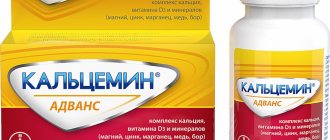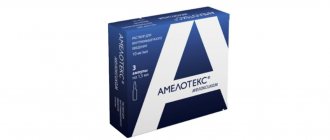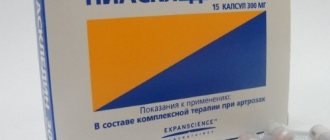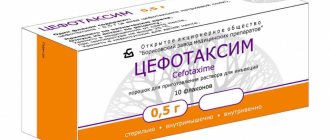pharmachologic effect
Stimulates cartilage restoration and reduces inflammation.
- Chondroitin sulfate is a substance involved in the formation of healthy cartilage tissue. At the same time, the viscosity of the synovial fluid is maintained, and enzymes that destroy cartilage are inhibited. In osteoarthritis, it reduces the manifestations of the disease and helps reduce the dose of non-steroidal anti-inflammatory drugs.
- Glucosamine sulfate improves the synthesis of substances that are the main components of cartilage, joint membranes and synovial fluid.
- Ibuprofen provides an anti-inflammatory effect, reduces pain, and has an antipyretic effect due to the blockade of cyclooxygenase-1 and cyclooxygenase-2 .
Glucosamine and chondroitin increase the analgesic effect of ibuprofen .
Reviews of Terfalex
Of the numerous reviews, most are positive. Patients are assured that the money spent is worth it and the drug really has the desired effect. After completing the treatment course, many people note that pain and crunching in the joints have disappeared, and mobility has increased. But even with such results, for some, the price of the drug is a significant disadvantage.
In general, it can be argued that with long-term therapy, tremendous results can be achieved. In this case, the patient should not have an advanced stage of the disease, and the course of treatment should last at least half a year. For many, a significant advantage is that Theraflex can be combined with anti-inflammatory drugs and other treatments.
Pharmacodynamics and pharmacokinetics
The bioavailability of glucosamine is about 25%, with the highest concentration of the substance found in joint cartilage, liver and kidneys, the highest concentration found in liver, kidneys and joint cartilage. Almost 30% of the incoming substance remains in the muscles and bones for quite a long time. The half-life is about 3 days, excreted in the urine.
The bioavailability of chondroitin sulfate after absorption from the gastrointestinal tract is approximately 13%. The maximum concentration occurs after 4 hours in the blood, and in the intra-articular fluid - within 5 hours. A large amount is found in synovial fluid. It is excreted from the body in urine.
After oral administration of ibuprofen, its maximum concentration occurs within 1 hour. Capable of binding to plasma proteins by 99% and penetrating into the intra-articular fluid. Metabolized in the liver, excreted by the kidneys. The half-life is about 3 hours.
How to take Theraflex capsules
Adults and adolescents over 15 years of age can take 1 tablet 3 times a day. The duration of the therapeutic course is 20 days. After this, the capsules are taken 2 times a day. Such treatment can last from 3 months to six months. Depending on the condition, the course can be resumed from time to time.
Capsules can be taken at any time of the day, regardless of meal time. You need to drink a small amount of liquid.
If ointment is used, then you need to squeeze out 2-3 cm and rub into the affected area until completely absorbed. This procedure is carried out 3 times a day.
Contraindications
- ulcerative lesions of the gastrointestinal tract ( gastric ulcer , Crohn's disease , ulcerative colitis);
- gastrointestinal bleeding;
- intracranial hemorrhages;
- bleeding disorders;
- aspirin asthma;
- hemorrhagic diathesis;
- children under 12 years of age;
- individual intolerance to the constituent components of the drug;
- pregnancy and breastfeeding;
- hypersensitivity to aspirin and NSAIDs.
Prescribed cautiously for arterial hypertension, heart failure, severe damage to kidney and liver function, gastrointestinal diseases, hyperbilirubinemia, nephrotic syndrome, blood diseases, diabetes mellitus , bronchial asthma , and in elderly patients.
In case of intolerance to seafood products, the likelihood of developing an allergy to the drug increases.
special instructions
Avoid using Theraflex Advance concomitantly with other NSAIDs, including selective cox-2 inhibitors, due to an increased risk of ulceration or bleeding, as well as other adverse reactions. Adverse reactions can be minimized by taking the drug at the lowest effective dose for the shortest period necessary to control symptoms.
Gastrointestinal bleeding, ulceration or perforation, which may be fatal, with or without prior symptoms, has been reported for all NSAIDs at any time during treatment, regardless of a history of severe gastrointestinal complications.
The risk of gastrointestinal bleeding, ulceration, or perforation increases with increasing doses of NSAIDs, with a history of ulcers, particularly those complicated by bleeding or perforation, and in the elderly. Such patients should begin treatment with the lowest available dose. For these patients, combination treatment with protective drugs (particularly misoprostol or proton pump inhibitors) should be considered, as should patients who require concomitant use of low-dose acetylsalicylic acid or other drugs that may increase the risk of gastrointestinal complications. .
Patients with a history of gastrointestinal disorders, especially the elderly, should report any unusual abdominal symptoms (particularly gastrointestinal bleeding) to the physician, especially during the early stages of therapy. Caution should be exercised when treating patients concomitantly receiving drugs that may increase the risk of peptic ulcers or bleeding, such as oral corticosteroids, anticoagulants such as warfarin, selective serotonin reuptake inhibitors and antiplatelet agents such as acetylsalicylic acid.
If patients receiving ibuprofen develop gastrointestinal bleeding or ulceration, treatment should be discontinued.
NSAIDs should be used with caution in patients with a history of ulcerative colitis or Crohn's disease, as their health may deteriorate.
If acetylsalicylic acid is used to suppress platelet aggregation, you should consult your doctor before starting treatment with Theraflex Advance®.
There is evidence that drugs that inhibit COX/prostaglandin synthesis may impair female fertility due to their effect on ovulation. This can be corrected by stopping these medications.
Clinical trial results and epidemiological data suggest that the use of ibuprofen, especially in high doses (2400 mg/day) during long-term treatment, may be associated with a slight increase in the risk of arterial thrombotic complications (for example, myocardial infarction or stroke). Overall, epidemiological studies do not suggest that low-dose ibuprofen use (≤1200 mg/day) is associated with an increased risk of myocardial infarction.
For patients with uncontrolled hypertension, congestive heart failure, diagnosed coronary artery disease, peripheral arterial disease and/or cerebrovascular disease, long-term treatment should be prescribed by a physician only after careful analysis. In individuals with significant risk factors for cardiovascular complications (such as hypertension, hyperlipidemia, diabetes mellitus, smoking), long-term treatment with NSAIDs should be prescribed only after careful consideration.
Very rarely, severe skin reactions, some fatal, have been reported with NSAIDs, including exfoliative dermatitis, Stevens-Johnson syndrome and toxic epidermal necrolysis. Obviously, the highest risk of such reactions is in the early stages of treatment: the onset of such a reaction in most cases was observed within the 1st month of treatment. Treatment with ibuprofen should be discontinued at the first sign of skin rash, mucosal ulceration or any other sign of hypersensitivity.
Ibuprofen may cause bronchospasm and asthma attacks or other hypersensitivity reactions. Risk factors for such reactions include pre-existing asthma, hay fever, nasal polyps, sensitivity to acetylsalicylic acid, or chronic respiratory disease. This also applies to patients who experience allergic reactions to ibuprofen or other NSAIDs (in particular skin reactions, itching, urticaria).
It is not recommended to drink alcohol during treatment with Theraflex Advance®.
The drug should be used with caution in patients with:
- systemic lupus erythematosus and systemic connective tissue diseases - increased risk of aseptic meningitis;
- A history of hypertension and/or heart failure, which was accompanied by fluid retention and edema when using NSAIDs;
- impaired renal and/or liver function; liver dysfunction increases the risk of renal toxicity and injury, as well as severe and potentially fatal liver reactions. For patients with liver or kidney disease, additional examinations are recommended before starting treatment: monitoring liver and kidney function and peripheral blood tests.
Long-term use of NSAIDs can lead to a dose-dependent decrease in prostaglandin synthesis and provoke the development of renal failure. Patients taking diuretics, persons with impaired liver function, kidney function and/or cardiac disorders are at high risk; elderly patients.
Features of the use of glucosamine sulfate and chondroitin sulfate. The drug should not be used in patients with hypersensitivity (allergy) to seafood.
It is possible that asthma symptoms may worsen in patients with a history of asthma after starting treatment with glucosamine.
Rarely, edema and/or water retention in the body have been observed in patients with heart and/or renal failure. This may be due to the osmotic effect of chondroitin sulfate.
You should contact your doctor if your symptoms worsen after starting this drug.
Use during pregnancy and lactation. Despite the fact that the use of drugs containing ibuprofen is contraindicated only in the third trimester of pregnancy, there is no clinical data on the effectiveness and safety of the use of glucosamine sulfate during pregnancy and lactation. Therefore, the drug should not be used during these periods.
Children. There is no experience in using the drug in children (under 18 years of age).
The ability to influence reaction speed when driving vehicles or working with other mechanisms. The patient should monitor for changes in his reaction speed before driving or operating machinery. If any adverse effects from the nervous system are detected, such activities should be abandoned.
Side effects
Nausea, diarrhea , abdominal pain, flatulence, constipation and allergic reactions may occur. If the drug is discontinued, the side effects disappear.
Most adverse reactions occur to ibuprofen , which is part of the drug.
- Digestive system: dry mouth, stomatitis, abdominal pain, heartburn, nausea and vomiting, flatulence, constipation and diarrhea, pancreatitis and hepatitis.
- Respiratory system: bronchospasm and shortness of breath.
- CNS: dizziness, headache, irritability, insomnia, drowsiness, depression, hallucinations and confusion.
- Sense organs: hearing changes (noise or ringing in the ears, hearing loss), dry eyes, double vision, swelling of the eyelids and conjunctiva.
- Heart and blood vessels: rapid heartbeat, increased blood pressure, heart failure.
- Urinary system: nephrotic syndrome , cystitis , nephritis , acute renal failure.
- Hematopoietic system: thrombocytopenia , anemia , leukopenia , thrombocytopenic purpura, increased duration of bleeding.
- Allergic reactions: erythematous rash , skin itching, urticaria, anaphylactic shock , Quincke's edema , bronchospasm, exudative erythema multiforme, Lyell's syndrome, allergic rhinitis, eosinophilia.
Interaction
Ethanol , tricyclic antidepressants , rifampicin , barbiturates when taken together increase the risk of liver damage.
Teraflex Advance is able to reduce the effect of antihypertensive drugs (ACE inhibitors and calcium channel blockers), furosemide , hydrochlorothiazide and uricosuric drugs.
The drug enhances the effects of antiplatelet agents , anticoagulants and fibrinolytics , thereby increasing the risk of bleeding.
Potentiates the side effects of drugs that have an ulcerogenic effect - NSAIDs, ethanol, estrogens, corticosteroids.
Antacids reduce the absorption of ibuprofen .
Teraflex Advance increases the effect of insulin and other hypoglycemic drugs, increases the concentration of cardiac glycosides, methotrexate and lithium-containing drugs in the blood.
The analgesic effect of the drug may be increased by caffeine .
Ibuprofen reduces the anti-inflammatory and antiplatelet effect of aspirin.
Cefoperazone , cefamandole , valproic acid , plicamycin , cefotetan increase the risk of developing hypoprothrombinemia.
Combined use with myelotoxic drugs increases the toxic effect on the blood system.
Taking with gold preparations and cyclosporine increases nephrotoxicity and hepatotoxicity .
Glucosamine can reduce the effect of doxorubicin , hypoglycemic drugs, teniposide , chloramphenicol , semisynthetic penicillins and increase the absorption of tetracyclines.
Teraflex Advance price, where to buy
The price of Teraflex Advance is from 406 rubles. for 30 capsules up to 1464 rub. for 120 capsules. In Ukraine, the average cost of the drug is about 373 UAH. for 120 capsules.
- Online pharmacies in RussiaRussia
- Online pharmacies in UkraineUkraine
- Online pharmacies in KazakhstanKazakhstan
ZdravCity
- Teraflex Advance capsules 120 pcs. Contract Pharmacal Corporation
RUB 2,453 order
Pharmacy Dialogue
- Teraflex Advance capsules No. 120Contract
RUB 2,426 order
- Teraflex Advance (caps. No. 60)Contract
RUB 1,562 order
show more
Pharmacy24
- Teraflex Advance No. 60 capsules Contract Pharmacal Corporation, USA
253 UAH. order - Teraflex Advance No. 120 capsules Contract Pharmacal Corporation, USA
425 UAH. order
PaniPharmacy
- Teraflex Advance capsule Teraflex Advance capsules No. 120, Contract Pharmacal Corporation
464 UAH order
- Teraflex Advance capsule Teraflex Advance capsules No. 60, Contract Pharmacal Corporation
251 UAH order
show more
Note!
Description of the drug Teraflex Advance caps. No. 120 on this page is a simplified author’s version of the apteka911 website, created on the basis of the instructions for use.
Before purchasing or using the drug, you should consult your doctor and read the manufacturer's original instructions (attached to each package of the drug). Information about the drug is provided for informational purposes only and should not be used as a guide to self-medication. Only a doctor can decide to prescribe the drug, as well as determine the dose and methods of its use.




